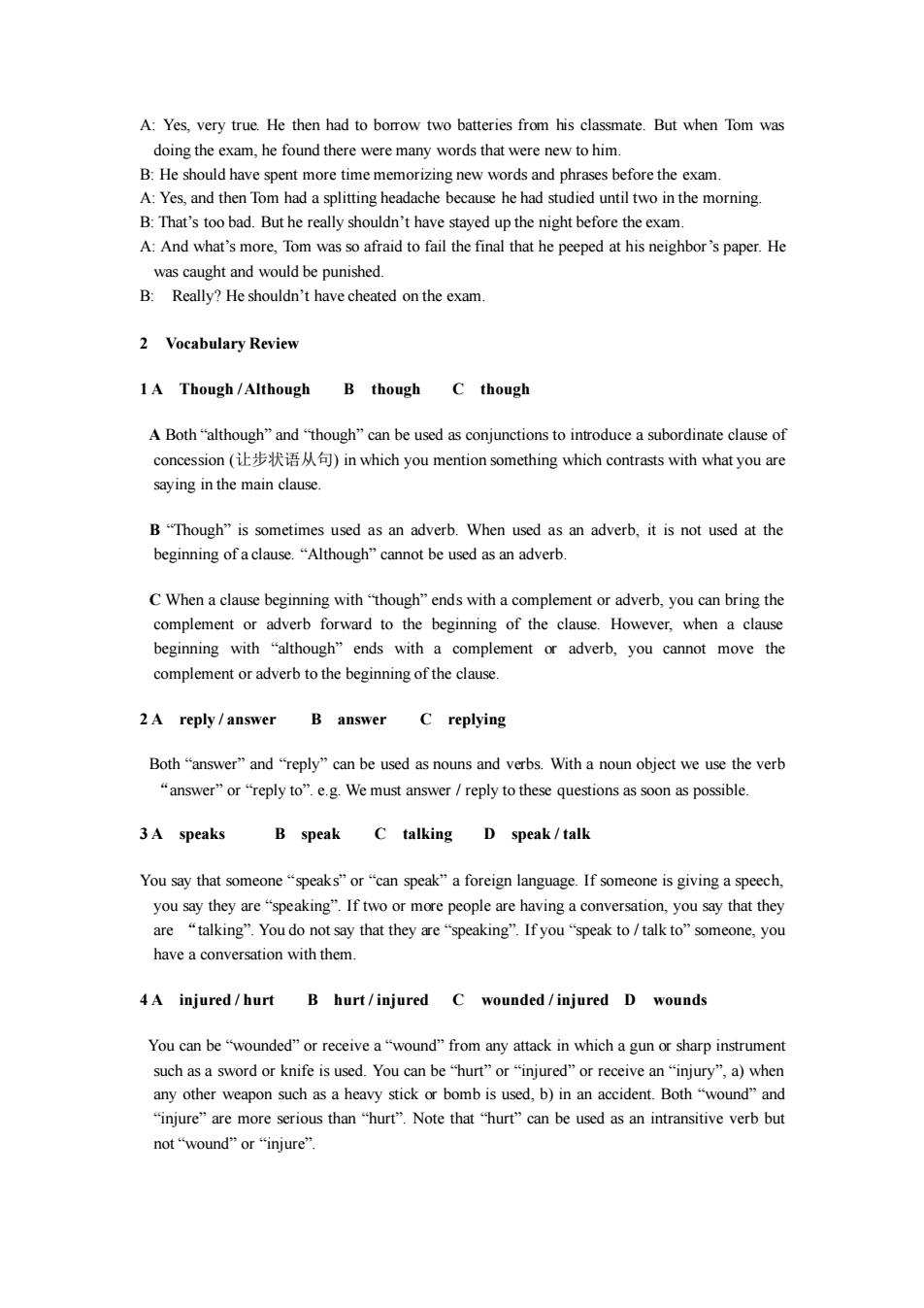正在加载图片...

A:Yes,very true.He then had to borrow two batteries from his classmate.But when Tom was doing the exam,he found there were many words that were new to him. B:He should have spent more time memorizing new words and phrases before the exam. A:Yes,and then Tom had a splitting headache because he had studied until two in the morning. B:That's too bad.But he really shouldn't have stayed up the night before the exam. A:And what's more,Tom was so afraid to fail the final that he peeped at his neighbor's paper.He was caught and would be punished. B:Really?He shouldn't have cheated on the exam. 2 Vocabulary Review 1A Though/Although B though C though A Both"although"and "though"can be used as conjunctions to introduce a subordinate clause of concession(让步状语从句)in which you mention something which contrasts with what you are saying in the main clause. B "Though"is sometimes used as an adverb.When used as an adverb,it is not used at the beginning of a clause."Although"cannot be used as an adverb. C When a clause beginning with"though"ends with a complement or adverb,you can bring the complement or adverb forward to the beginning of the clause.However,when a clause beginning with "although"ends with a complement or adverb,you cannot move the complement or adverb to the beginning of the clause. 2A reply/answer B answer C replying Both"answer"and "reply"can be used as nouns and verbs.With a noun object we use the verb “answer'”or“reply to”.e.g.We must answer/reply to these questions as soon as possible. 3A speaks B speak C talking D speak/talk You say that someone“speaks'”or“can speak'”a foreign language.If someone is giving a speech, you say they are"speaking".If two or more people are having a conversation,you say that they are“talking”.You do not say that they are“speaking'”.Ifyou“speak to/talk to”someone,you have a conversation with them. 4A injured/hurt B hurt/injured C wounded/injured D wounds You can be“wounded”or receive a“wound'”from any attack in which a gun or sharp instrument such as a sword or knife is used.You can be"hurt'”or“injured”or receive an“injury”,a)when any other weapon such as a heavy stick or bomb is used,b)in an accident.Both"wound"and “injure”are more serious than“hurt”.Note that "hurt'”can be used as an intransitive verb but not“wound”or“injure”A: Yes, very true. He then had to borrow two batteries from his classmate. But when Tom was doing the exam, he found there were many words that were new to him. B: He should have spent more time memorizing new words and phrases before the exam. A: Yes, and then Tom had a splitting headache because he had studied until two in the morning. B: That’s too bad. But he really shouldn’t have stayed up the night before the exam. A: And what’s more, Tom was so afraid to fail the final that he peeped at his neighbor’s paper. He was caught and would be punished. B: Really? He shouldn’t have cheated on the exam. 2 Vocabulary Review 1 A Though / Although B though C though A Both “although” and “though” can be used as conjunctions to introduce a subordinate clause of concession (让步状语从句) in which you mention something which contrasts with what you are saying in the main clause. B “Though” is sometimes used as an adverb. When used as an adverb, it is not used at the beginning of a clause. “Although” cannot be used as an adverb. C When a clause beginning with “though” ends with a complement or adverb, you can bring the complement or adverb forward to the beginning of the clause. However, when a clause beginning with “although” ends with a complement or adverb, you cannot move the complement or adverb to the beginning of the clause. 2 A reply / answer B answer C replying Both “answer” and “reply” can be used as nouns and verbs. With a noun object we use the verb “answer” or “reply to”. e.g. We must answer / reply to these questions as soon as possible. 3 A speaks B speak C talking D speak / talk You say that someone “speaks” or “can speak” a foreign language. If someone is giving a speech, you say they are “speaking”. If two or more people are having a conversation, you say that they are “talking”. You do not say that they are “speaking”. If you “speak to / talk to” someone, you have a conversation with them. 4 A injured / hurt B hurt / injured C wounded / injured D wounds You can be “wounded” or receive a “wound” from any attack in which a gun or sharp instrument such as a sword or knife is used. You can be “hurt” or “injured” or receive an “injury”, a) when any other weapon such as a heavy stick or bomb is used, b) in an accident. Both “wound” and “injure” are more serious than “hurt”. Note that “hurt” can be used as an intransitive verb but not “wound” or “injure